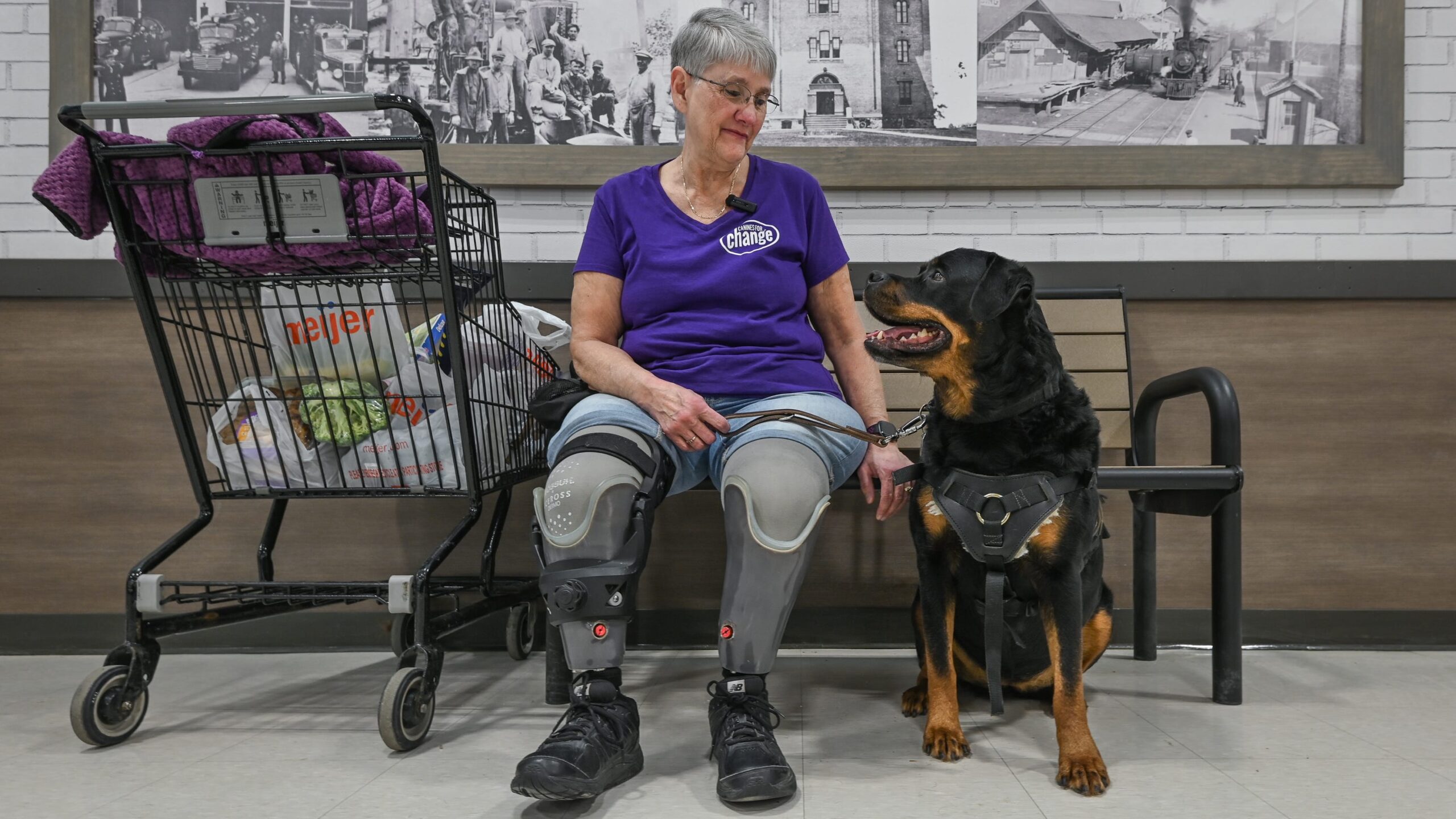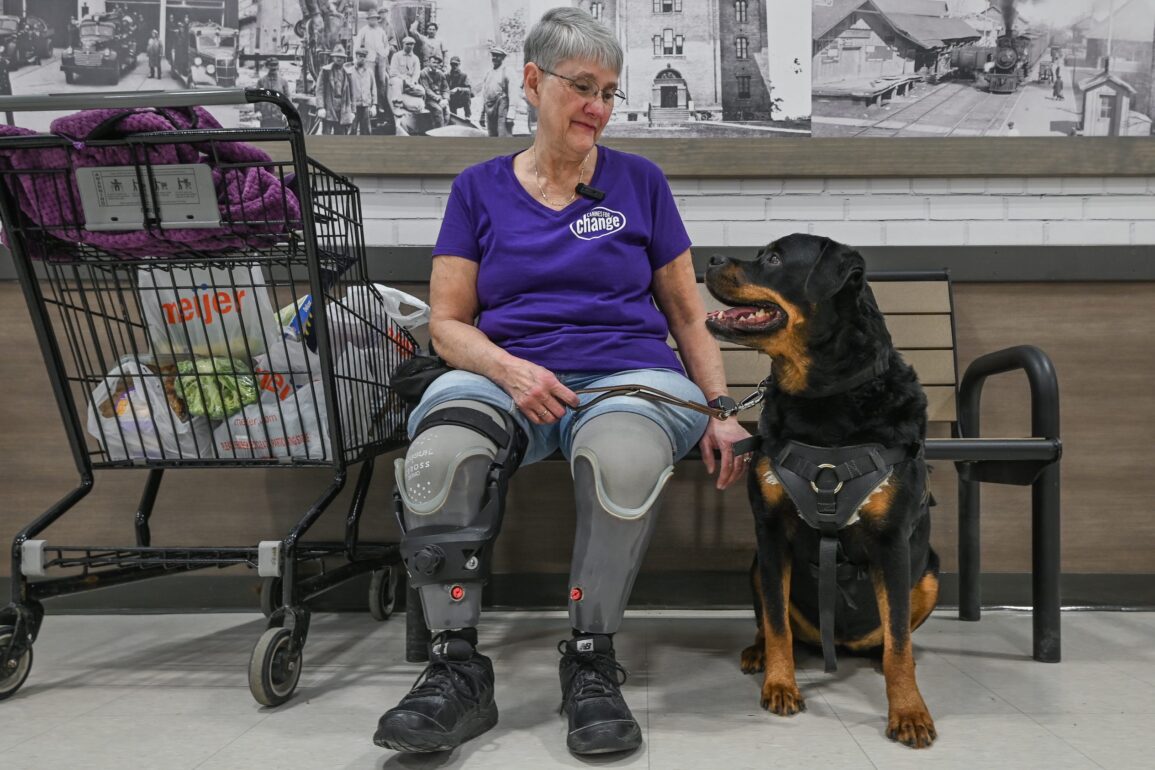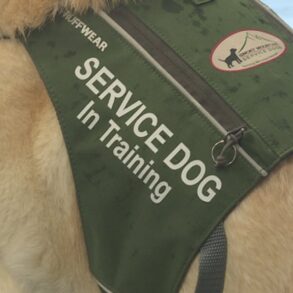
Video: Meet Nala, a 95-pound service dog with a knack for rescues
“She gives me back my independence,” Tammy Nickerson, a double-amputee, said about Nala, her Rottweiler service dog.
Task-trained service dogs serve a vital role, from alerting owners to life-threatening allergens or imminent seizures to helping calm someone with an anxiety disorder.
Service dogs are working wonders, but fake service dogs, advocates say, are a real thing and exacerbating the challenges people with disabilities who rely on the four-legged canine helpers already face, according to a recent article from USA TODAY.
Fake service dogs are poorly trained or untrained dogs passed off by people who are trying to gain access to restricted places or to obtain additional benefits.
People with service animals report a high prevalence of interference from poorly trained or untrained dogs; 79% reported uncontrolled dogs snapping at, biting or interfering with their service dogs, according to a 2022 survey.
Does New Jersey have laws for service animals and their owners? We break it down for you here.
What qualifies as a service dog in New Jersey?
A service dog is defined as “any dog individually trained” to meet the needs of a person with a disability — mentally or physically — according to the New Jersey Law Against Discrimination. A person with a disability must keep the dog in their immediate custody at all times. Service dogs perform tasks such as:
- Protection or rescue work
- Pulling a wheelchair
- Retrieving dropped items
- Assisting persons with epilepsy or other seize disorders
A guide dog or “seeing eye dog” is trained to assist persons who are deaf or blind.
Do service dogs have to wear vests in NJ?
New Jersey law follows federal ADA laws, which don’t require service dogs to wear vests or any other ID that indicates they are a service dog.
Some handlers voluntarily carry ID cards, fit their dogs with vests or other markers to avoid conflicts or to alert others that the dog is performing work.
NJ documentation requirements for service animals
Service dog handlers are not required to carry or present documentation proving their animal’s status, nor can businesses or other entities demand certification, identification or proof of training as a condition for access, according to the New Jersey Law Against Discrimination.
If the dog has been trained, but not by a facility and instead the owner, the federal ADA law applies, and the public facility may ask two questions: If the dog is required due to a disability and what tasks it has been trained to perform. Asking for documentation or details about the handler’s condition is considered discriminatory.
Where are service dogs allowed in NJ?
The New Jersey Law Against Discrimination entitles any person with a disability who uses a service or guide dog full access to public facilities as long as the dog has been trained by a recognized training agency. It is illegal for businesses to impose additional fees or conditions for service dog handlers, and hotels or rental car companies must waive pet fees.
Areas service animals are welcome include, but aren’t limited to:
- Restaurants
- Schools
- Hotels
- Hospitals
- Shopping centers
- Grocery stores
- Taxis
- Theaters
- Health clubs
- Beaches
- Parks and zoos
- Streets and sidewalks
- Public buildings
A service or guide dog trainer in the process of training a dog has the same rights and privileges to access public facilities, NJ law states.
Can I pet a service dog?
While well-intentioned, it’s important to be mindful of service dog etiquette, per Canine Companions:
- Don’t touch a dog without asking permission first. Dogs are working and may be in the middle of a command or direction from its handler, and some may need to be “released” from work mode in order to interact
- Do not feed a dog. They may be on a special diet, or it could prove a serious distraction
- Approach a service dog calmly and speak to the person, not the service dog before touching or addressing the dog. Most handlers don’t mind talking about their service dogs if time allows, and some may even enjoy it
What are NJ laws for emotional support animals?
Emotional support animals, such as therapy, comfort or companion animals, are not considered service animals under the ADA because they have not been trained to perform a specific task or job and do not have the same legal protections under NJ law.
Can you get in trouble for having a fake service dog in NJ?
In New Jersey, any person who puts their dog in a guide dog harness to falsely pass it off as a seeing-eye dog used by blind persons can be fined between $100 and $500. Additionally, pretending to have a disability, such as filing fraudulent disability claims, is a disorderly persons offense in New Jersey and carries fines of up to $1,000 and up to six months in jail.
Lori Comstock is a New Jersey-based journalist with the Mid-Atlantic Connect Team.
This post was originally published on this site be sure to check out more of their content.











































